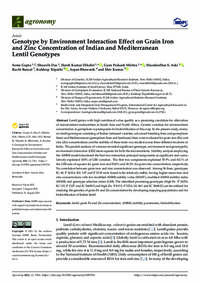Genotype by Environment Interaction Effect on Grain Iron and Zinc Concentration of Indian and Mediterranean Lentil Genotypes

Authors:
Lentil grains with high nutritional value qualify as a promising candidate for alleviation
of micronutrient malnutrition in South Asia and North Africa. Genetic variation for micronutrient
concentration in germplasm is prerequisite for biofortification of this crop. In the present study, ninetysix
lentil genotypes consisting of Indian (released varieties, advanced breeding lines and germplasm
lines) and Mediterranean (germplasm lines and landraces) lines were evaluated for grain iron (Fe) and
zinc (Zn) concentrations and the stability of these traits was studied across three different locations in
India. The pooled analysis of variance revealed significant genotype, environment and genotype by
environment interaction (GEI) mean squares for both the micronutrients. Stability analysis employing
the AMMI model elucidated the first two interaction principal components as significant and cumulatively
explained 100% of GEI variation. The first two components explained 55.9% and 44.1% of
the GEI sum of squares for grain iron and 50.8% and 49.2% for grain zinc concentration, respectively.
No correlation between grain iron and zinc concentration was observed. Among 96 lines, genotypes
IG 49, P 16214, ILL 147 and P 2118 were found to be relatively stable, having higher mean iron and
zinc concentrations with low modified AMMI stability value (MASV), modified AMMI stability index
(MASI) and genotype selection index (GSI). The identified promising genotypes (high Fe: P 16214,
IG 115, P 2127 and IC 560812 and high Zn: P 8115, P 3234, LL 461 and IC 560812) can be utilized for
studying the genetics of grain Fe and Zn concentration by developing mapping populations and for
biofortification of Indian lentil.
